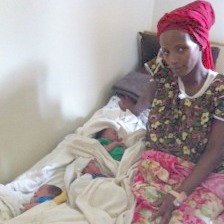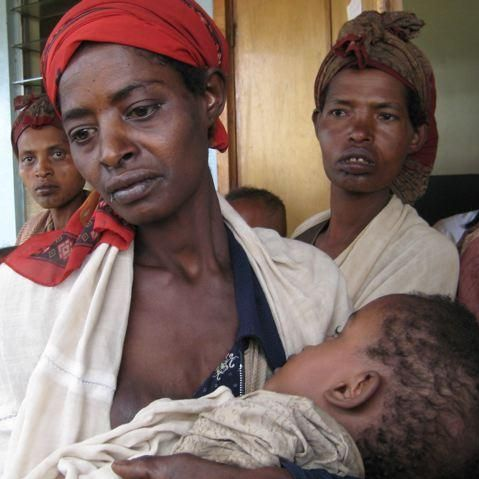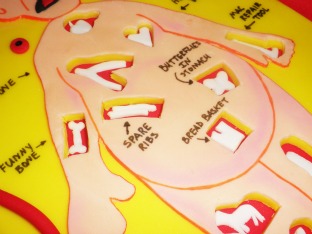One in a Million Babies
 One in 729,000. That is the odds of having quadruplets naturally - without the aid of fertility medicines. And for this young Ethiopian lady, it happened 5 days ago. With no prenatal care, and no knowledge of the multiple babies she was carrying, she made the trek from her rural home to the local health center. There she gave birth to four babies, one of whom died soon after birth.
One in 729,000. That is the odds of having quadruplets naturally - without the aid of fertility medicines. And for this young Ethiopian lady, it happened 5 days ago. With no prenatal care, and no knowledge of the multiple babies she was carrying, she made the trek from her rural home to the local health center. There she gave birth to four babies, one of whom died soon after birth.
She was advised to seek further care at a hospital, and found her way to us. The mother herself is being treated with antibiotics for a suspected uterine infection, but she is expected to make a full recovery. The three surviving kids are doing well. Two of them have a mild omphalitis (an infection of the umbilical cord stump) and are being treated with IV antibiotics. They are expected to do well.
The three celebrated the Ethiopian New Year yesterday on their fourth day of life. The new family is the talk of the hospital as we ring in the New Year. A multiple gestation pregnancy is high-risk in any country, but especially here where over 90% of the women have no access to prenatal care. Though we mourn the loss of one of the babies, we praise God for the miracle of a healthy mom and three healthy infants.
6 Ways We Are Reaching the Poorest of the Poor
 Being a mission hospital means taking care of the poor. We are commanded to do this by Jesus, and it is something we desire to do. If we offer free care, we will be inundated with patients. How could we possibly treat them all? If we charge for the care, we may overlook many who are very poor. What can we do?
Being a mission hospital means taking care of the poor. We are commanded to do this by Jesus, and it is something we desire to do. If we offer free care, we will be inundated with patients. How could we possibly treat them all? If we charge for the care, we may overlook many who are very poor. What can we do?
- First, everyone is expected to pay something. Even if it is only a few cents. It is simply not sustainable for us to provide free care. Indeed, most Africans have a social safety net made up of family, friends, church members, etc. who can contribute to their medical expenses. However, we recognize that this will not be enough for some patients. For them, we have a Benevolent Fund that can cover their costs.
- We have a committee of nationals who evaluate patients and their eligibility for the Benevolent Fund. In a country like Ethiopia, where many in the population live on less than $1 per day, it can be difficult to sort out who are the poorest among the poor. Particularly for Westerners working here. Relative to our background, everyone seems poor, and we would likely put everyone on the Benevolent Fund. That is why it is so crucial to have nationals evaluate these situations on a case-by-case basis.
- We lower costs as much as possible by using expatriate specialist staff who are funded separately through their respective mission agencies. We still have to pay for all the operating costs of the hospital, the nursing staff, our national doctors, and supplies. But we offset these costs with donations and some volunteer staff. Much of our equipment is donated which lowers capital expenses for the hospital and this is passed on to patients.
- The rural poor in Africa have less than a 10% chance of seeing a doctor in their lifetime. The medical services simply do not exist for the vast numbers of people. (Ethiopia alone has close to 100 million inhabitants.) Ultimately, it comes down to training. We are training surgeons, physicians, medical students, and nurses. If we are truly going to expand our reach to the poorest of the poor, we must increase capacity in the face of such great need.
- We are going out into the community with Community Health Evangelism, Helicopter Outreaches to the T'ara people, and rural prenatal clinics. These initiatives are taking the Gospel and quality medical care to rural poor who would otherwise never see a a doctor.
- Your donations make a difference. As we have written on here before, 96% of the money you give on this site, goes directly to Ethiopia. A significant portion of that goes to the Benevolent Fund. Which in turn pays for care for the poorest of the poor.
Click here to give today, and know that you are giving to an organization that is doing all it can to reach "the least of these."
What's Your Specialty?
At Soddo Christian Hospital, we offer all types of general and specialized care. Here's a sampling of specialized services that we offer at Soddo Christian Hospital:
- We have an outpatient department with an emergency room and non-urgent primary care. We see pediatric and adult patients. Our general medical staff includes a US-trained pediatrician, emergency physician, family nurse practitioner, and tropical disease expert. We have a European-trained geriatrician, as well as a national internal medicine specialist who sees clinic patients and inpatients.
- We have two, that's right TWO, US-trained general and trauma surgeons. They serve as the primary faculty advisors for the general surgery residency program at the hospital. (Yes, we are a teaching hospital affiliated with the Pan-African Academy of Christian Surgeons). This team performs other surgeries as well including a fair amount of urologic procedures.
- Orthopedic Surgery - we have a US-trained orthopedic surgeon and perform a full gamut of bone and joint surgeries with pediatric and adult patients, including arthroscopic surgery!
- Obstetrics & Gynecology - our US-trained obstetrician and team of midwives perform deliveries and C-sections as well as expert gynecology services.
- Subspecialties are available on an occasional basis. Through World Medical Mission, we have plastic surgeons, ENT (ear, nose & throat), urologists, and neurosurgeons come and work in Soddo on a frequent basis.
As you can see, we are well staffed to take care of all types of emergent and non-emergent conditions!
Does a mission hospital treat everyone?
This is a question that we get asked a lot. So we wanted to address it. And the answer is... yes!
Our hospital is a mission hospital. You can read all about our mission and values here. But suffice it to say, that we exist not just to treat people with excellent medical care, but to proclaim the Gospel of Jesus Christ and make disciples.
But do we treat anyone who comes in the door, no matter what their faith or background? Of course we do! We are proud to serve the people of this part of Ethiopia. Fortunately, as our reputation has grown, now we are also seeing patients referred to us from all over the country. And these patients come from all types of backgrounds. Some are Ethiopian Orthodox, some are Muslim, some are animistic, and some are Protestant. We see and treat them all.
In the hospital, our staff will offer to pray with patients regardless of their background. We believe that a person's health should be attended to physically and spiritually. We find that our patients really respond to the fact that we care about them in this wholistic manner.
Often, if a patient is open to hearing about it, we will share with them the life-giving message of the Gospel. We don't force it. But we do give them the opportunity to hear. We play the Jesus Film in the hospital. We will often provide a Bible in Amharic. By God's grace, we have seen over 500 patients profess faith in Christ since the hospital opened its doors. But even for those that kindly decline, we aim to provide excellent care just the same.



